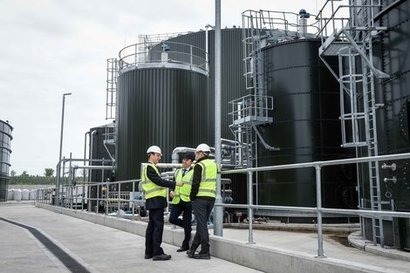
If adopted, the framework could mean that everyone in England recycling the same set of core materials by 2025, no matter where they live in the country. Collaborative action to address recycling barriers is central to the framework, including working with local authorities to collect more core materials, including food waste, which could then become available for biogas generation.
The framework is supported by Defra and DCLG and offers the opportunity to increase recycling, thereby improving the quality of recycled materials and offering a comprehensive service to householders. Cumulative benefits estimated over an eight year period include the availability of up to 11 million tonnes of extra recyclable material diverted from disposal, including more than 8 million tonnes of food waste. This in turn would prevent 5 million tonnes of greenhouse gases from being released into the atmosphere while increasing England’s recycling rate by seven percentage points.
“Food waste in England is a hugely valuable resource and an opportunity which is still largely untapped” said Charlotte Morton, Chief Executive of the Anaerobic Digestion and Bioresources Association (ADBA), which served as one of seventeen advisory groups on the framework . “Separate collections help meet the aim of reducing waste arising, while making the most of unavoidable waste by recycling it through anaerobic digestion into much needed biogas and biofertiliser. ADBA is delighted to have participated in the steering group on the case for greater consistency in household recycling from its inception. The AD industry is particularly pleased that the value of food waste has been recognised by the inclusion of separate collections in all three options for councils going forward, and our members look forward to working with local authorities to turn this vision into reality.
Ms Morton added that Defra, WRAP and the other organisations involved should all be congratulated for their part in bringing forward the framework. As the business case makes clear, separate food waste collections require investment but are vital to improving recycling rates in a cost-effective way.
More consistent household recycling isn’t going to be easy, it will require the collective action of brands, retailers, manufacturers, local authorities, waste management companies and reprocessors. However, action in many of the areas highlighted in the framework is already underway with enthusiasm from across the sector.
At present, WRAP is working with seven local authority areas which are evaluating the business case for consistency locally. In addition, a review of sorting infrastructure in support of greater consistency will commence soon.
The rationale behind the framework, ‘The case for greater consistency in household recycling’, has been published outlining the benefits of greater consistency and why the opportunities have been put forward, while the benefits to each sector, and the desired actions for them to take, are laid out in the Benefits to Business documents.
Image courtesy of Biogen
For additional information:

